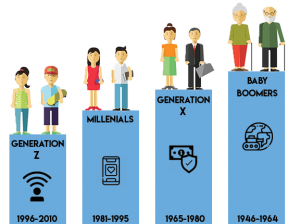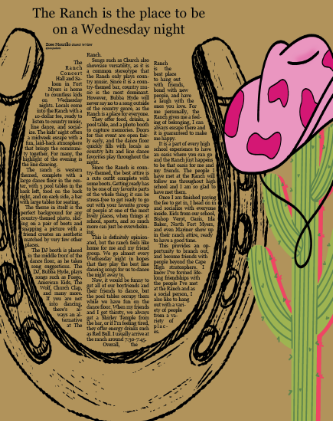A generational divide causes conflict

The Icon of Each Generation: A generation is defined by the ages of its members.
Junior Sydney Driskell has had enough of people judging her by her age. Knowledgeable, politically active and vocal about her opinions, she knows just as much about what’s happening in her world as anyone. And yet she has felt backlash for her ideas based purely on her youth. “Like, you don’t know what you’re talking about, you don’t have any wisdom, you’re not getting your information from reliable sources, things like that,” she said.
She’s not alone. For generations topics like politics, global issues, and social change have been dominated by those above a certain age, while youth have traditionally been shunted into the background when decisions are being made. However, as this begins to change, the true extent of the generation gap is being pulled into the spotlight.
The youth are beginning to not only educate themselves, but also educate others. An awareness of issues that will continue to impact those of a younger age, such as global warming, has contributed to this surplus of passion involving political views.
A lack of understanding between people of different ages is something most people have experienced at one point or another. “Anytime growing up people are going to experience generation gaps; the old will not understand the young, that’s not something new,” said AP World History teacher (and member of Generation X) Daniel Gross.
The divide itself may be nothing new, but with each passing year, the conflict that comes with it has seemed to get more and more heated.
TOK teacher Kara Smith attributes this rise in vitriol to the rise of social media. “Now it’s all out there. People are now able to throw opinions out there so easily, and I think that’s really causing animosity on both sides.”
Gross agrees. “I think social media has allowed people to say things that they would not say in person, and treat people the way they would not personally,” he said.
While social media may have allowed the schism a place in the public eye, it is only the vehicle for thoughts and ideas that represents more serious concerns. “I think what my generation is really feeling is that we’re seeing a lot of older people in politics that aren’t taking our issues seriously,” Driskell said. “They’re not going to be here to see the effects of climate change. They don’t have to feel the fear of going to school the day after a shooting.”
The feeling that older generations are unable or unwilling to consider the views and experiences of younger ones isn’t unique to the most recent generations. Even as an adult, Smith too has felt that her positions are often taken with a grain of salt. “I think people will just disregard other viewpoints, going ‘Oh, well, you’re just young, you’ll come around when you wisen up,’” she said.
Whatever the case, it appears that age-based quarrels won’t be disappearing anytime soon. “The further generations are always going to keep progressing, so I think there is always going to be disdain between them,” said Driskell.
Smith doesn’t disagree but believes that there are ways to reduce the hostility. “There’s a saying along the lines of ‘If everyone could sit down and share a meal together, a lot of problems would go away,’ and I like that,” she said. “We are all much, much more similar than dissimilar. It’s just about getting people to take that risk.”
Your donation will support the student journalists of Cape Coral High School. Your contribution will allow us to purchase equipment and cover our annual website hosting costs.








